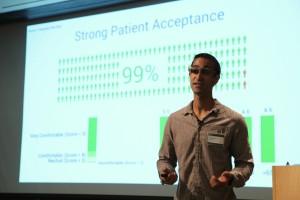
Originally published on MedCityNews.com. The founders of Augmedix still haven’t revealed exactly what the stealthy Google Glass startup is up to, but at Rock Health’s Demo Day Tuesday, they gave some insight into the early traction the nascent company has found with investors and users.

Originally published on MedCityNews.com. The founders of Augmedix still haven’t revealed exactly what the stealthy Google Glass startup is up to, but at Rock Health’s Demo Day Tuesday, they gave some insight into the early traction the nascent company has found with investors and users.
The company has four pilots up and running, employs about 20 people and is backed by at least one VC firm, co-founder Ian Shakil told the crowd who gathered to hear Rock Health’s fifth accelerator class pitch.
Shakil, who has worked at Edwards Lifesciences and Intuitive Surgical, founded the company with Stanford med student Pelu Tran after they had the opportunity to try out an early version of Google Glass last summer. Immediately they began exploring “every healthcare use case you can think of,” Shakil said.
What they kept coming back to was the idea that about a quarter of a doctor’s time is spent “feeding the beast,” as Shakil likes to say, or doing administrative work involving electronic medical records. Augmedix proposes that the augmented reality device could help cut down on that time and repurpose it to be spent on direct patient care. The company will offer a suite of services and software to make that possible.
There’s no shortage of Google Glass skeptics, especially in healthcare where privacy is of the utmost concern. But Shakil said Augmedix observed 200 patient-physician interactions at three different pilot sights and found that 99 percent of the patients, who were informed about Glass and told they could opt out, were OK with their doctor wearing them.
Shakil is in the camp that believes the device will catch on first in enterprise settings, particularly in healthcare where doctors are poised to benefit. “Their work is urgent, documentation is a burden, they’re scarce, they’re expensive, they’re mobile and they need their hands,” he explained.
In that regard, Augmedix is in good company. Qualcomm Life and Palomar Health are rolling out an incubator to explore medical applications of Glass. A few companies are already one step ahead, like Mutualink, which is developing an app for first responders, and Pristine, which is focused on surgeons.
Glass isn’t yet commercially available. Google gave early access to some developers, charging them $1,500 for the device. It’s expected to be ready to ship to the general public next year.
[Image courtesy Rock Health]

